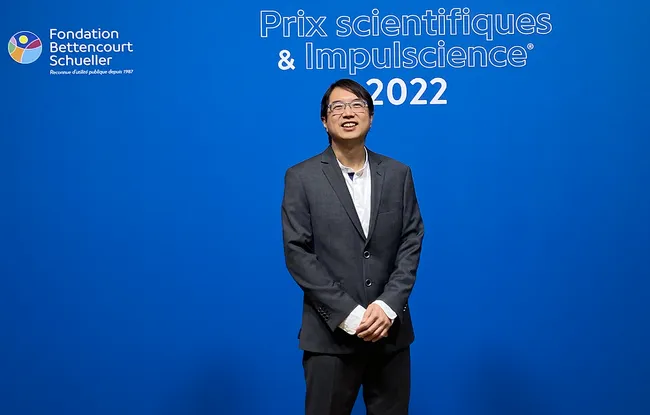- Home >
- Institut Curie News >
- Chunlong Chen, first Institut Curie’s recipient of the Fondation Bettencourt Schueller Impulscience program.
Awarded by the Fondation Bettencourt Schueller, Impulscience aims to recognize innovative projects in the field of life science. It is aimed at researchers younger than 50, working in a public laboratory in France who were classified category A during the Starting, Consolidator or Advanced calls for proposals from the European Research Council (ERC). It involves financial support of up to €2.3 million for each project over a duration of five years, to ensure the necessary conditions to advance their work.
This year, Chunlong Chen, group leader in “Replication program and genome instability” (Dynamics of Genetic Information: fundamental bases and cancer (DIG-Cancer) unit CNRS UMR3244 / Institut Curie / Sorbonne University) at Institut Curie Research Center, is among the seven recipients of the inaugural round of the program.
This grant will allow Chunlong Chen to deepen his work on deregulation of the DNA replication program and its effect on genome stability.
The choice of Chunlong Chen’s project for this prestigious program highlights the quality of the research he conducts on a daily basis and the scientific excellence of the Research Center. My sincere congratulations to him
Says Alain Puisieux, director of Institut Curie Research Center.
Arriving in 2016, Chunlong Chen is a bioinformatician with vast experience using high-throughput sequencing applied to issues in fundamental biology. He specializes in DNA replication and the regulation of gene transcription to try to understand how the deregulation of these processes destabilizes the genome and can lead to the onset of diseases such as cancer. His team is among the global leaders in this field.
This grant will allow me to recruit collaborators, train young doctoral candidates and post-doctoral researchers and build an interdisciplinary team in the long term. The funding will also be invested in innovative technologies which are required for the research, but still expensive: single-cell genome sequencing, but also high-throughput single-molecule technology, allowing us to see DNA in the microscope, molecule by molecule
He explains.
His aim is now to develop new bioinformatic algorithms to analyze genome instability and replication dynamics during development, as well as in the context of tumors. In exploring the genomic instability of cancers more deeply, the aim is to better understand how the disease evolves. “We want to demonstrate that the different forms of replicative stress that cause structural variations in the cell are directly related to the onset of cancer.” From a more clinical perspective, this research could lead to the identification of signatures, which are key in developing new treatments.
Discover the interview of Chunlong Chen produced by the Bettancourt Schueller foundation.



